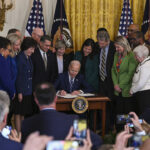Improving Railroad Crossing Safety with Federal Funding
One of the leading topics of discussion revolves around the $46 million aid from the federal Bipartisan Infrastructure Law assigned to Yuma, Arizona. This fund aims to augment the safety conditions around its three railroad crossings, a central issue that has raised serious concern over the past few years.
Addressing the Value of Safety
We’ve all witnessed the tragic consequences of inadequate safety measures at railroad crossings. This infusion of cash represents a crucial step in mitigating the risks associated with these crossings, a testament to the commitment of authorities to ensure the safety of local residents and all those who use these routes. However, legislation and funding alone cannot completely eradicate the problem.
Trooper Shortage and the Erosion of Community Safety
While the situation in Yuma is looking optimistic, the state of Arizona faces a shortage of troopers, to the extent that night patrols are practically non-existent in most of its counties. The ramifications of this staff dearth are hard-hitting and compromise public safety in myriad ways. Are budget constraints the underlying issue, or is there a further possibility of systemic inefficiency?
Night patrols: An Essential Element of Public Safety
Although Yuma is gearing up to improve its railroad safety, the lack of night patrols in most Arizona counties poses a threat that can’t be ignored. Maricopa and Pima are the only two counties out of Arizona’s 15 where patrol activity extends beyond midnight. This is a considerable setback to general law enforcement efforts and needs immediate attention.
The Grand Canyon Waterline Project
Another encouraging development for Arizona is the Grand Canyon Waterline Project, an initiative worth $208 million that aims to replace outdated water lines. As the Grand Canyon draws more visitors each year, maintaining the necessary infrastructure in areas of high tourist activity has never been more important than it is today.
Ensuring Access to Basic Amenities
Combating the issues of an old water system while simultaneously addressing concerns for growing numbers of Grand Canyon visitors, the Trans-Canyon Water Project indeed holds promise. It is crucial to ensure that basic amenities such as water supply are ample and efficiently delivered, especially for a location as globally frequented as the Grand Canyon.
Arizona’s Stance on Ultra-Processed Foods in School Meals
On another note, the introduction of a bill by Republican Representative Leo Biasiucci, which aims to ban ultra-processed foods in public school meals, serves as an emphatic statement on the importance of food quality in schools. This could trigger a significant shift in student nutrition and could inspire other states to follow the model set by Arizona.
Nutrition and the Future
While public attention continues to sway between railway safety, trooper shortages, and waterline projects, it is critical to remember that health-oriented initiatives such as food regulations in school canteens carry equally significant ramifications. It is initiatives like these that will shape the future of our children’s health and in turn, the prosperity of our nation.
Conclusion
There is much at stake in the current socio-political scenario in Arizona. From bolstering public safety with improved railroad crossing provisions to a potential paradigm shift in schools’ approach to nutrition – it is clear that these diverse arenas hold much promise for positive change. It is essential not only to applaud these strides but also to remain vigilant to ensure their successful implementation.
Originally Post From https://www.azfamily.com/video/2025/01/16/federal-funding-heading-yuma-improve-railroad-crossing-safety/
Read more about this topic at
Arizona’s Family (3TV / CBS 5)
Live Arizona updates


